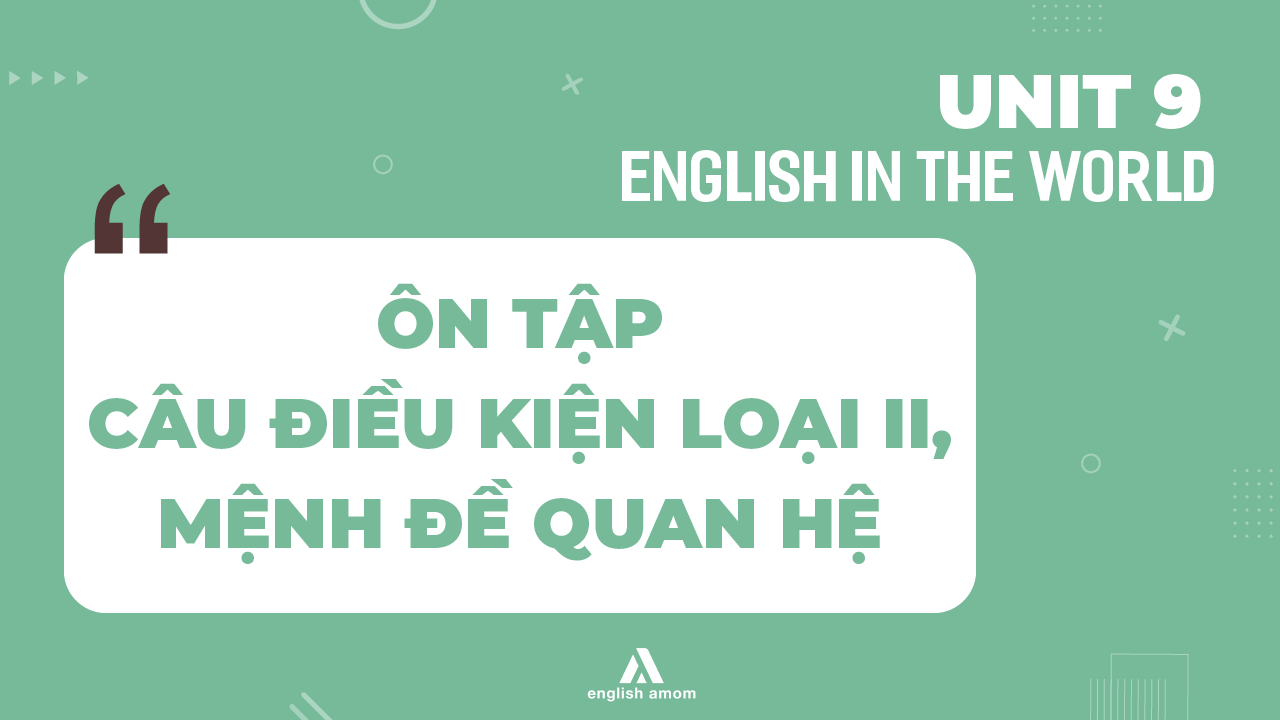
► Kênh hỏi đáp và giải thích thắc mắc kiến thức MIỄN PHÍ → truy cập LINK NHÓM: ENGLISH AMOM
► Kênh YOUTUBE hệ thống toàn bộ bài giảng CLIPS: truy cập LINK: ENGLISH AMOM CHANNEL
► Kênh TIKTOK: ENGLISH AMOM
I. LÝ THUYẾT
A) CÂU ĐIỀU KIỆN LOẠI II
Xem lại lý thuyết về câu điều kiện loại II và làm các bài thực hành: Tại đây
B) MỆNH ĐỀ QUAN HỆ
► Vai trò của mệnh đề quan hệ trong câu
Mệnh đề quan hệ có vai trò làm rõ nghĩa cho một danh từ đứng trước nó được cấu tạo từ đại từ quan hệ và một mệnh đề hoàn chỉnh.
Ex: My parents whom I love most are farmers.
► Các đại từ quan hệ
|
Đại từ quan hệ |
Vai trò |
Ví dụ |
|
Who |
Thay thế tân ngữ hoặc chủ ngữ chỉ người. |
My father likes my friend who lives in the city. |
|
Whom
|
Thay thế tân ngữ chỉ người. |
My father whom I love very much is very kind. |
|
Whose |
Thay thế cho tính từ sở hữu của người hoặc vật. |
That is Mai whose father knows me. |
|
Which
|
Thay thế cho tân ngữ hoặc chủ ngữ chỉ sự vật hay sự việc. - Mệnh đề quan hệ sử dụng đại từ “which” còn có tác dụng làm rõ nghĩa cho toàn bộ mệnh đề trước nó. |
I have just bought a car which looks nice. I’m reading the book, which I bought last week. |
|
That
|
Thay thế cho tân ngữ hoặc chủ ngữ chỉ người hoặc vật trong mệnh đề quan hệ xác định. |
This is the guy that is my mother’s friend |
|
Where
|
Thay thế cho trạng từ chỉ địa điểm, nơi chốn , thường thay cho there ….N (place) + WHERE + S + V …. (WHERE = ON / IN / AT +WHICH) |
The cityside where I was born is very crowded |
|
When
|
Thay thế từ chỉ thời gian, thường thay cho từ then ….N (time) + WHEN + S + V … (WHEN = ON / IN / AT + WHICH) |
The winter when people often stay indoor is very cold |
|
Why
|
Thay thế cho cụm for the reason, for that reason. …..N (reason) + WHY + S + V … |
I don’t know why you didn’t go to school. |
II. BÀI TẬP
2) Rewrite the sentences using the conditional sentences type 2 ( Page 35 )
Example: (Ví dụ)
Peter has such a lot of English homework that he won’t go to the party.
→ If Peter didn’t have such a lot of English homework, he would go to the party.
1. I don't feel confident at interviews because English is not very good.
2. Minh doesn't read many English books because she doesn't have time.
3. I think you should spend more time improving your pronunciation.
4. Mai is so good at the language because has some friends who are native speak English.
5. We can't offer you the job because you can't speak English.
ĐÁP ÁN
1. If my English were/was good, I would feel confident at interviews.
2. If Minh had time, she would read many English books.
3. If I were you, I would spend more time improving my pronunciation.
4. Mai didn't have some friends who were/are native speakers of English, she wouldn't be so good at the language.
5. If you could speak English, we would offer you the job.
6) Rewrite these sentences as one sentence using a relative clause ( Page 36)
1. My friend plays the guitar. He has just released a CD.
→ My friend who/that plays the guitar has just released a CD.
2. Parts of the palace are open to the public. It is where the queen lives.
→
3. English has borrowed many words. They come from other languages.
→
4. I moved to a new school. English is taught by native teachers there.
→
5. I don't like Enqlish. There are several reasons for that.
→
6. The new girl in our class is reasonably good at English. Her name is Mi.
→
ĐÁP ÁN
2. Parts of the palace where/in which the queen lives are open to the public.
3. English has borrowed many words which/that come from other languages.
4. I moved to a new school where/in which English is taught by native teachers.
5. There are several reasons why I don't like English.
6. The new girl in our class, whose name is Mi, is reasonably good at English.

